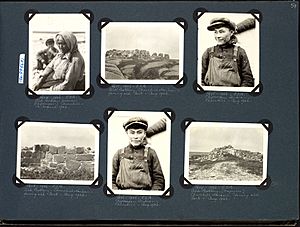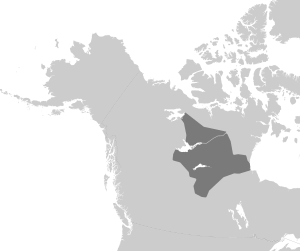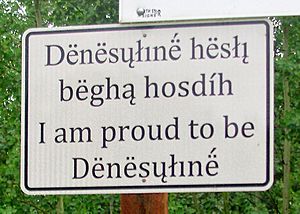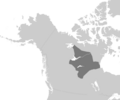Chipewyan facts for kids
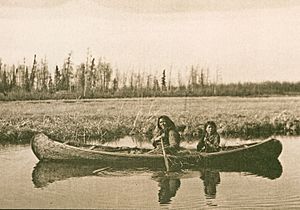
A Chipewyan woman and child set out to hunt muskrat in Garson Lake, Saskatchewan
|
|
| Total population | |
|---|---|
| 30,910 (2016 census) | |
| Regions with significant populations | |
| Canada | |
| Saskatchewan | 12,875 |
| Northwest Territories | 7,820 |
| Alberta | 6,350 |
| Manitoba | 1,905 |
| British Columbia | 1,225 |
| Languages | |
| English, Denesuline | |
| Religion | |
| Christianity, Animism | |
| Related ethnic groups | |
| Dene, Yellowknives, Tłı̨chǫ, Slavey, Sahtu | |
The Chipewyan people, also known as the Denesuline or Dënesųłı̨né, are an Indigenous group in Western Canada. Their name, Dënesųłı̨né, means "the original/real people." They are part of the larger Dene family of peoples and speak a language from the Athabaskan language family. Their ancestors are linked to the ancient Taltheilei Shale culture.
Contents
What's in a Name?
The Chipewyan people are known by several names. Early French missionaries sometimes called them "Montagnais." This name was confusing because it was also used for a different group of people in Quebec.
The name Chipewyan comes from the Plains Cree language. It means "pointed skin," likely referring to the style of their parkas. Today, most people prefer to use Dene and Denesuline to describe themselves and their language.
Where Do They Live?
The Chipewyan people live across a large area of Western Canada. This includes parts of the Northwest Territories and northern areas of Manitoba, Alberta, and Saskatchewan. There are also many important historical sites in Nunavut that belong to the Dënesųłı̨ne group.
Population and Communities
In 2016, there were over 25,000 registered members of Chipewyan First Nation communities. Many live in Saskatchewan, Alberta, Manitoba, and the Northwest Territories. Some communities have both Denesuline and Cree members.
There are also many Métis communities where people speak Denesuline. For example, in the village of La Loche, Saskatchewan, many residents speak Denesuline as their first language.
Remembering Their History
The Sayisi Dene people have a special memorial in Churchill, Manitoba. This memorial remembers their forced relocation in the past.
Their Way of Life
Historically, the Denesuline people were often allies with the Cree people to their south. They sometimes had conflicts with Inuit and other Dene groups to the north.
Important Figures
An important historical Denesuline woman was Thanadelthur. In the early 1700s, she helped her people make peace with the Cree. She also helped them get involved in the fur trade, which was very important at the time.
The Sayisi Dene Story
The Sayisi Dene of northern Manitoba are known for hunting caribou. They used to live near Little Duck Lake. In 1956, the government moved them to Churchill, Manitoba. Later, in the 1970s, they chose to return to their traditional caribou hunting lifestyle. They moved to Tadoule Lake, Manitoba, and became known as the "Sayisi Dene First Nation."
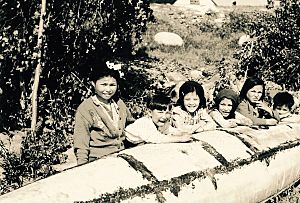
Culture and Traditions
In the past, the Chipewyan people were mostly nomadic, meaning they moved from place to place. They lived in small groups and used temporary homes like tepees. They wore special clothing, including one-piece pants and moccasins.
Their nomadic way of life began to change around 1717 when they met English traders. The Chipewyan became important in the fur trade. They exchanged furs and animal hides for metal tools, guns, and cloth.
Today, many Chipewyan people still practice traditional activities like fishing and hunting caribou. However, they use modern tools, nets, and transportation. Some live in permanent homes, while others still move between places.
Their Language
The Denesuline people speak the Denesuline language. This language is part of the larger Athabaskan language family. The name they use for themselves, Denésoliné, means "people."
Speakers of Denesuline understand each other, even though there are different dialects. For example, some people use a 'k' sound where others use a 't' sound.
The Importance of Names
In 2015, a Chipewyan woman in the Northwest Territories faced a challenge. She wanted to use a special character (ʔ) in her daughter's name, Sahaiʔa. This character is important in the Denesuline language. The government initially said their documents could not use this character. This situation showed how important it is for Indigenous people to use their traditional names and spellings.
Notable Chipewyan People
- Matonabbee (Matąnebı́)
- Thanadelthur (Thánadëltth'ér)
- Louis Riel was a grandson of a Chipewyan
Images for kids
-
A Chipewyan woman and child set out to hunt muskrat in Garson Lake, Saskatchewan
-
Denesuline children by canoe in La Loche
See also
 In Spanish: Dene suliné para niños
In Spanish: Dene suliné para niños
 | Audre Lorde |
 | John Berry Meachum |
 | Ferdinand Lee Barnett |


